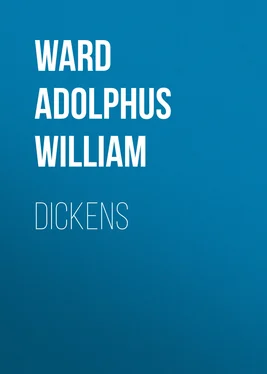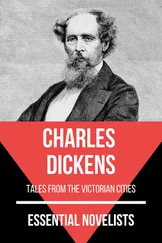Adolphus Ward - Dickens
Здесь есть возможность читать онлайн «Adolphus Ward - Dickens» — ознакомительный отрывок электронной книги совершенно бесплатно, а после прочтения отрывка купить полную версию. В некоторых случаях можно слушать аудио, скачать через торрент в формате fb2 и присутствует краткое содержание. Жанр: Биографии и Мемуары, foreign_antique, на английском языке. Описание произведения, (предисловие) а так же отзывы посетителей доступны на портале библиотеки ЛибКат.
- Название:Dickens
- Автор:
- Жанр:
- Год:неизвестен
- ISBN:нет данных
- Рейтинг книги:5 / 5. Голосов: 1
-
Избранное:Добавить в избранное
- Отзывы:
-
Ваша оценка:
- 100
- 1
- 2
- 3
- 4
- 5
Dickens: краткое содержание, описание и аннотация
Предлагаем к чтению аннотацию, описание, краткое содержание или предисловие (зависит от того, что написал сам автор книги «Dickens»). Если вы не нашли необходимую информацию о книге — напишите в комментариях, мы постараемся отыскать её.
Dickens — читать онлайн ознакомительный отрывок
Ниже представлен текст книги, разбитый по страницам. Система сохранения места последней прочитанной страницы, позволяет с удобством читать онлайн бесплатно книгу «Dickens», без необходимости каждый раз заново искать на чём Вы остановились. Поставьте закладку, и сможете в любой момент перейти на страницу, на которой закончили чтение.
Интервал:
Закладка:
To the earlier part of 1838 belong one or two other publications, which their author never cared to reprint. The first of these, however, a short pamphlet entitled Sunday under Three Heads , is not without a certain biographical interest. This little book was written with immediate reference to a bill “for the better observance of the Sabbath,” which the House of Commons had recently thrown out by a small majority; and its special purpose was the advocacy of Sunday excursions, and harmless Sunday amusements, in lieu of the alternate gloom and drunkenness distinguishing what Dickens called a London Sunday as it is . His own love of fresh air and brightness intensified his hatred of a formalism which shuts its ears to argument. In the powerful picture of a Sunday evening in London, “gloomy, close, and stale,” which he afterwards drew in Little Dorrit , he almost seems to hold Sabbatarianism and the weather responsible for one another. When he afterwards saw a Parisian Sunday, he thought it “not comfortable,” so that, like others who hate bigotry, he may perhaps have come to recognise the difficulty of arranging an English Sunday as it might be made . On the other hand, he may have remembered his youthful fancy of the good clergyman encouraging a game of cricket after church, when thirty years later, writing from Edinburgh, he playfully pictured the counterpart of Sunday as Sabbath bills would have it : describing how “the usual preparations are making for the band in the open air in the afternoon, and the usual pretty children (selected for that purpose) are at this moment hanging garlands round the Scott monument preparatory to the innocent Sunday dance round that edifice with which the diversions invariably close.” The Sketches of Young Gentlemen , published in the same year, are little if at all in advance of the earlier Sketches by Boz , and were evidently written to order. He finished them in precisely a fortnight, and noted in his diary that “one hundred and twenty-five pounds for such a book, without any name to it, is pretty well.” The Sketches of Young Couples , which followed as late as 1840, have the advantage of a facetious introduction, suggested by her Majesty’s own announcement of her approaching marriage. But the life has long gone out of these pleasantries, as it has from others of the same cast, in which many a mirthful spirit, forced to coin its mirth into money, has ere now spent itself.
It was the better fortune of Dickens to be able almost from the first to keep nearly all his writings on a level with his powers. He never made a bolder step forwards than when, in the very midst of the production of Pickwick , he began his first long continuous story, the Adventures of Oliver Twist . Those who have looked at the MS. of this famous novel will remember the vigour of the handwriting, and how few, in comparison with his later MSS., are the additions and obliterations which it exhibits. But here and there the writing shows traces of excitement; for the author’s heart was in his work, and much of it, contrary to his later habit, was written at night. No doubt he was upheld in the labour of authorship by something besides ambition and consciousness of strength. Oliver Twist was certainly written with a purpose , and with one that was afterwards avowed. The author intended to put before his readers—“so long as their speech did not offend the ear”—a picture of “dregs of life,” hitherto, as he believed, never exhibited by any novelist in their loathsome reality. Yet the old masters of fiction, Fielding in particular, as well as the old master of the brush whom Dickens cites (Hogarth), had not shrunk from the path which their disciple now essayed. Dickens, however, was naturally thinking of his own generation, which had already relished Paul Clifford , and which was not to be debarred from exciting itself over Jack Sheppard , begun before Oliver Twist had been completed, and in the self-same magazine. Dickens’s purpose was an honest and a praiseworthy one. But the most powerful and at the same time the most lovable element in his genius suggested the silver lining to the cloud. To that unfailing power of sympathy which was the mainspring of both his most affecting and his most humorous touches, we owe the redeeming features in his company of criminals; not only the devotion and the heroism of Nancy, but the irresistible vivacity of the Artful Dodger, and the good-humour of Charley Bates, which moved Talfourd to “plead as earnestly in mitigation of judgment” against him as ever he had done “at the bar for any client he most respected.” Other parts of the story were less carefully tempered. Mr. Fang, the police-magistrate, appears to have been a rather hasty portrait of a living original; and the whole picture of Bumble and Bumbledom was certainly a caricature of the working of the new Poor-law, confounding the question of its merits and demerits with that of its occasional maladministration. On the other hand, a vein of truest pathos runs through the whole of poor Nancy’s story, and adds to the effect of a marvellously powerful catastrophe. From Nancy’s interview with Rose at London Bridge to the closing scenes—the flight of Sikes, his death at Jacob’s Island, and the end of the Jew—the action has an intensity rare in the literature of the terrible. By the side of this genuine tragic force, which perhaps it would be easiest to parallel from some of the “low” domestic tragedy of the Elizabethans, the author’s comic humour burst forth upon the world in a variety of entirely new types: Bumble and his partner; Noah Claypole, complete in himself, but full of promise for Uriah Heep; and the Jew, with all the pupils and supporters of his establishment of technical education. Undeniably the story of Oliver Twist also contains much that is artificial and stilted, with much that is weak and (the author of Endymion is to be thanked for the word) “gushy.” Thus, all the Maylie scenes, down to the last in which Oliver discreetly “glides” away from the lovers, are barely endurable. But, whatever its shortcomings, Oliver Twist remains an almost unique example of a young author’s brilliant success in an enterprise of complete novelty and extreme difficulty. Some of its situations continue to exercise their power even over readers already familiarly acquainted with them; and some of its characters will live by the side of Dickens’s happiest and most finished creations. Even had a sapient critic been right who declared, during the progress of the story, that Mr. Dickens appeared to have worked out “the particular vein of humour which had hitherto yielded so much attractive metal,” it would have been worked out to some purpose. After making his readers merry with Pickwick , he had thrilled them with Oliver Twist ; and by the one book as by the other he had made them think better of mankind.
But neither had his vein been worked out, nor was his hand content with a single task. In April, 1838, several months before the completion of Oliver Twist , the first number of Nicholas Nickleby appeared; and while engaged upon the composition of these books he contributed to Bentley’s Miscellany , of which he retained the editorship till the early part of 1839, several smaller articles. Of these, the Mudfog Papers have been recently thought worth reprinting; but even supposing the satire against the Association for the Advancement of Everything to have not yet altogether lost its savour, the fun of the day before yesterday refuses to be revived. Nicholas Nickleby , published in twenty numbers, was the labour of many months, but was produced under so great a press of work that during the whole time of publication Dickens was never a single number in advance. Yet, though not one of the most perfect of his books, it is indisputably one of the most thoroughly original, and signally illustrates the absurdity of recent attempts to draw a distinction between the imaginative romance of the past and the realistic novel of the present. Dickens was never so strong as when he produced from the real; and in this instance—starting, no doubt, with a healthy prejudice—so carefully had he inspected the neighbourhood of the Yorkshire schools, of which Dotheboys Hall was to be held up as the infamous type, that there seems to be no difficulty in identifying the site of the very school itself; while the Portsmouth Theatre is to the full as accurate a study as the Yorkshire school. So, again, as every one knows, the Brothers Cheeryble were real personages well known in Manchester, 3 3 W. & D. Grant Brothers had their warehouse at the lower end of Cannon Street, and their private house in Mosely Street.
where even the original of Tim Linkinwater still survives in local remembrance. On the other hand, with how conscious a strength has the author’s imaginative power used and transmuted his materials: in the Squeers family creating a group of inimitable grotesqueness; in their humblest victim Smike giving one of his earliest pictures of those outcasts whom he drew again and again with such infinite tenderness; and in Mr. Vincent Crummles and his company, including the Phenomenon, establishing a jest, but a kindly one, for all times! In a third series of episodes in this book, it is universally agreed that the author has no less conspicuously failed. Dickens’s first attempt to picture the manners and customs of the aristocracy certainly resulted in portraying some very peculiar people. Lord Frederick Verisopht, indeed—who is allowed to redeem his character in the end—is not without touches resembling nature.
Интервал:
Закладка:
Похожие книги на «Dickens»
Представляем Вашему вниманию похожие книги на «Dickens» списком для выбора. Мы отобрали схожую по названию и смыслу литературу в надежде предоставить читателям больше вариантов отыскать новые, интересные, ещё непрочитанные произведения.
Обсуждение, отзывы о книге «Dickens» и просто собственные мнения читателей. Оставьте ваши комментарии, напишите, что Вы думаете о произведении, его смысле или главных героях. Укажите что конкретно понравилось, а что нет, и почему Вы так считаете.












